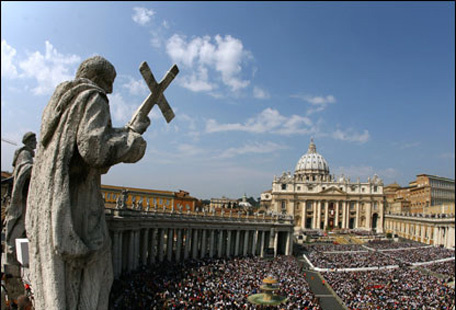Iran, and the Saudi Fatwa against Christians

The recent fatwa by a Saudi mufti calling for the destruction of Christian churches in the peninsula and in countries bordering the Persian Gulf has caused strong reactions from Christian leaders around the world. In response to a question raised by a Kuwaiti member of parliament about the ban on construction of churches in the country, Abdul Aziz Al Sheik, who is considered one of the most important religious leaders in Saudi Arabia, issued a fatwa banning the construction of any type of place of worship for Christians in the peninsula, and called for the destruction of existing sites. Considering the growth of Islamic extremism in the region and Saudi Arabia’s role in extending spiritual and financial support for Takfiri groups (hard-line Salafists), the issuing of this fatwa at this juncture should be considered a sensitive topic.
The leaders of the Catholic Church in Russia, Germany, and Austria have shown very strong reactions to the stances of the Saudi regime’s mufti, and have stated that his views don’t embody the slightest respect for the right to religious freedom or for the coexistence of religions. Saudi media and the satellite networks associated with the ruling dynasty of that country have prevented the widespread coverage of this fatwa. However, the position of the Saudi Mufti took place at a time when concerns-- particularly among religious minorities-- over the expansion of Islamic extremism in the region and the role of Persian Gulf Sheikhdoms, and at the top the Saudis, in supporting Takfiri groups, are on the rise.
Since the beginning of protests in the Arab world and the coming to power of Islamists in Libya, Egypt, Tunisia and Morocco, and activities of Takfiri groups in Libya, Syria and Yemen, the issue of hard-line Islamists’ role (in governance) has brought about the reaction of leaders of religious minorities. During the past year, numerous reports of the destruction of religious places belonging to Sufis in Somalia and Libya and attacks against churches and Christian and Alavi neighborhoods in Syria by armed groups, and clashes between Coptic Christians and Muslims in Egypt, have been published. Christian leaders in Egypt, Lebanon, and Syria have explicitly expressed their concerns about this trend. In this context, different reports have pointed to the abundance of Saudi assistance, in the form of money and weapons, to these Takfiri groups; particularly in Syria against the government of Bashar Assad who is branded by Wahhabi leaders as an Alavi atheist who “needs to be killed”.
During the past year, the Patriarch of Christian Maronites in Lebanon has repeatedly expressed his concerns about extreme Islamism in the event the Syrian government is toppled, and has defended the leadership of Bashar Assad. Along the same line, leaders of Syrian Christians who compose close to 10 percent of this country’s population have sided with Bashar Assad and have expressed concern about repercussions of what is called “Arab Winter.” Undoubtedly, the bitter experience of Christians in Lebanon during the civil war and in Iraq after the collapse of Saddam Hussein has deeply affected the current position of religious leaders and most Christian political leaders in Lebanon and Syria.
In this situation, it was no surprise to see harsh reactions to the Saudi fatwa against Christians. Of course, what is surprising is the fact that despite the existence of U.S. military bases in Saudi Arabia and the Persian Gulf Sheikhdoms, the Saudi Mufti has not shown the slightest reaction to them or protested their existence.
The important point with regard to the recent Al Sheikh fatwa relates to the viewpoint of King Abdullah of Saudi Arabia and his efforts to control the power of Wahhabi extremists and present a moderate image of his country at the international level. In this context, a conference on the dialogue among religions was held by King Abdullah in Spain last year. One of the objectives of that conference was to promote Riyadh as a cultural power and supporter of inter-religious dialogue in the region and beyond. However, with the issuance of the fatwa by the Saudi Mufti, these efforts have faced difficulties, particularly when one considers that the fatwa cannot be issued without the blessing of the Saudi leadership.
During the presidency of Mohammad Khatami, Iran introduced the idea of dialogue among religions and cultures in international fora. This important achievement was then overshadowed by the policies of the Ahmadinejad government. At present, when Arab Spring developments have affected the plight of religious minorities in the region and the fear of expansion of extreme Islamism has spread from Afghanistan to the Arab Maghreb, the need for the realization of such an initiative by Iran is felt, more than before, bearing in mind the Iranian cultural and historical position in the region. However, it seems that Turkey and Saudi Arabia have made efforts to usurp this high position, as if their records show no suppression of Armenian minorities and Kurds in the case of Turkey, and no export of extreme ideas and suicide missions across the globe in the case of Saudi Arabia.

